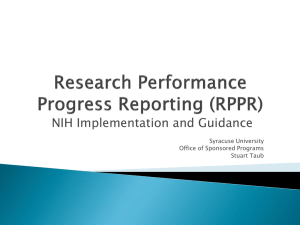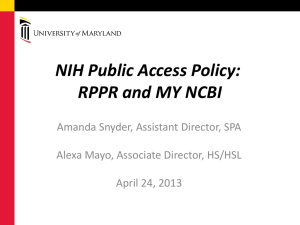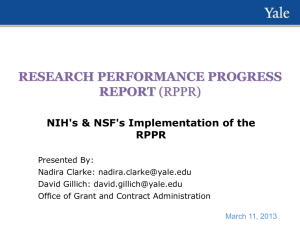Federal Update
advertisement
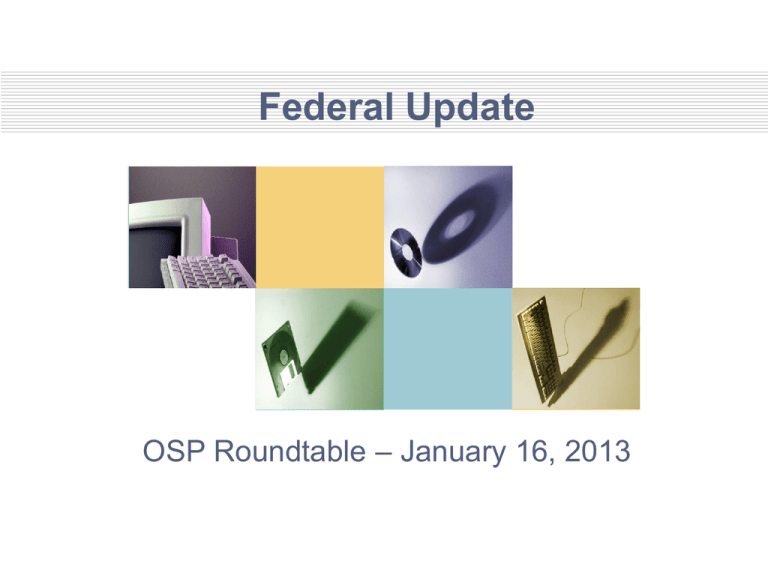
Federal Update OSP Roundtable – January 16, 2013 Updates and Reminder NIH Update RPPR NIH Public Access Policy ASSIST Continuing Resolution NSF Update Grant Proposal Guide Changes Research.gov NIH Update Research Performance Progress Report RPPR • As mandated by the Office of Management and Budget, NIH is implementing the new progress report format, RPPR, a Federal-wide initiative. • The new format for submitting progress reports have been available to all NIH grantees effective October 19, 2012 http://grants.nih.gov/grants/guide/notice-files/NOT-OD-12142.html RPPR • While optional at this time, NIH expects to require use of the RPPR for these activity codes in the Spring of 2013, and to pilot the RPPR for non-SNAP awards during calendar year 2013. Please stay tuned for further announcements! • The following Streamlined Non-Competing Award Process (SNAP) progress reports as well as Fellowship progress reports may use RPPR format: RPPR Activity Codes R01-like SNAPs D71, DP1, DP5, G08, G11, G13, P40, R00, R01, R03, R18, R21, R33, R34, R36, R37, R56, RC1, RC2, RL1, S10, S21, S22, SC1, SC2, SC3, UB1, UC2, UH1, UH2, UH3, UP5, P01, P20, P30, P40, P41, P50, PL1, R24, S11, U01, U10, U19, U24, U34, U54 Individual K SNAPs K01, K02, K05, K06, K07, K08, K18, K22, K23, K24, K25, K26, K99, KL1 Education SNAPs D43, K30, R13, R25, RL5, T14, T36, U13, U2R Fellowships F05, F30, F31, F32, F33, F34, F37 SBIR/STTR SNAPs R41, R42, R43, R44, U43, U44 RPPR • When initiating the progress report the PI will have the option to select either eSNAP or RPPR under above mechanisms. • It is important to know that after selecting either format, it is not possible to change unless you request help from the NIH Commons help desk. RPPR • Recommendations: – Become familiar with RPPR format: - NIH RPPR Instruction Guide - Webinar http://grants.nih.gov/grants/RPPR/ – Decide which format to use BEFORE starting the progress report Changes to the NIH Public Access Policy • Spring 2013: In an effort to enhance compliance, NIH will hold processing of non-competing continuation awards if publications arising from grant awards are not in compliance with the Public Access Policy. (http://grants.nih.gov/grants/guide/notice-files/NOT-OD-12-160.html) • New tools and enhancements which will make it easier for investigators report compliance information, and for investigators and institutions to track compliance. • Recommendations: • View NIH webinar which will help you better understand these changes. http://publicaccess.nih.gov/sponsored.htm – Describes the policy change – Provides an overview of My NCBI, a tool investigators use to track and report compliance – Describes the Public Access Compliance Monitor, a web based tool institutions can use to track public access compliance Changes to the NIH Public Access Policy • The use of My NCBI will be required to report papers, when electronically submitting progress reports using the new RPPR. My NCBI is a tool integrated with PubMed to track literature searches, collections of citations, and public access compliance . • Encourage Investigators to log into My NCBI now to track compliance. • Ask PI’s to delegate you access in the “Delegation in My Bibliography” section. Changes to the NIH Public Access Policy • My NCBI has a new feature within the “My Bibliography” section to allow you to generate a PDF report of publications that can be printed and submitted as part of the paper PHS 2590 progress report. http://grants.nih.gov/grants/guide/notice-files/NOT-OD-13-017.html • Public Access Compliance Monitor: – A New Web-Based tool for Institutions to Track Compliance of publications that full under the NIH Public Access Policy • Additional Resources: http://publicaccess.nih.gov/ ASSIST Application Submission System & Interface for Submission Tracking NIH is making changes to the application process for multi-project applications. ASSIST is used to prepare and submit multiproject grant applications electronically to NIH and other Public Health Service agencies. ASSIST NIH plans to transition all multi-project applications to electronic submission using the SF 424 (R&R) form set by January 2014. The transition will be done by activity code, in the same way NIH has completed previous electronic application transitions ASSIST In November 2012 —NIH began issuing a series of pilot funding opportunity announcements of varying activity codes that will require electronic submission for due dates between January and September 2013. September 25, 2013 — All applications submitted in response to FOAs with the following activity codes intended for September 25, 2013 due dates and beyond will require electronic submission: P01, P20, P50, R24, U24, U19. ASSIST Recommendations: • Review the ASSIST Transition Timeline http://grants.nih.gov/grants/ElectronicReceipt/fil es/Timeline_NIH_Complex_Transition.pdf • View Webinar http://grants.nih.gov/grants/webinar_docs/we binar_20121213.htm NIH Update NIH Operates under a Continuing Resolution “The CR continues government operations through March 27, 2013 at the FY 2012 level plus 0.6 percent.” “Until FY 2013 appropriations are enacted, NIH will issue non-competing research grant awards at a level below that indicated on the most recent Notice of Award (generally up to 90% of the previously committed level).” http://grants.nih.gov/grants/guide/notice-files/NOT-OD13-018.html NSF Update • A new version of the NSF Proposal & Award Policies & Procedures Guide (PAPPG), (NSF 13-1) has been issued. The PAPPG is comprised of documents relating to the Foundation's proposal and award process and consists of the: (a) Grant Proposal Guide (GPG) for guidance on the preparation and submission of proposals to NSF; and (b) Award & Administration Guide (AAG) to guide, manage, and monitor the award and administration of grants and cooperative agreements made by the Foundation. http://www.nsf.gov/pubs/policydocs/pappgui de/nsf13001/gpg_index.jsp?org=NSF New PAPP • The revised PAPP is effective for proposals submitted or due on or after January 14, 2013 • NSF 13-1 • GPG Summary of Changes: • http://www.nsf.gov/pubs/policydocs/pappguide/nsf13 001/gpg_sigchanges.jsp • AAG Summary of Changes • http://www.nsf.gov/pubs/policydocs/pappguide/nsf13 001/aag_sigchanges.jsp GPG Changes • Revisions to the NSF Merit Review Criteria which implement the National Science Board's (NSB) recommendations. Changes will affect the project summary and project description sections of proposals. Annual and final reports also will be affected. • http://www.nsf.gov/bfa/dias/policy/merit_review/ GPG Changes • For example, the Project Summary page has been revised to omit language regarding the inclusion of separate headings to address the two merit review criteria. In lieu of this approach, FastLane has been modified to display three separate text boxes in which proposers must provide an Overview and address the “Intellectual Merit’ and “Broader Impacts” of the proposed activity. GPG Changes • Revision of the Biographical Sketch(es) instructions to rename the "Publications" section to "Products" and amend terminology and instructions accordingly. • Clarification on indirect costs specifying that, except as noted in the PAPPG or a program solicitation, organizations must use the applicable negotiated indirect cost rate. GPG Changes • Facilities, Equipment and Other Resources, has been supplemented to indicate that an aggregated description of the internal and external resources that are, or will be available to the project (both physical and personnel) should be provided. A new format for submission of the Facilities, Equipment and Other Resources information will be available in FastLane when the PAPPG becomes effective in January 2013. The new format will assist proposers in complying with the NSF cost sharing policy. NSF Project Reports • On March 18, 2013, the National Science Foundation (NSF) will completely transfer all project reporting from FastLane to Research.gov. This means that Principal Investigators (PIs) and Co-PIs will use Research.gov to meet all NSF project reporting requirements, including submission of Final, Annual and Interim Project Reports and the Project Outcomes Report. The new Project Reporting Dashboard will make it easier for PIs, Co-PIs, and Sponsored Project Office (SPO) staff to see which reports are due or overdue, and will provide access to all reports submitted to NSF. Research.gov provides research-related information and grants management services in one location. Research.gov is the modernization of FastLane, providing the next generation of grants management capabilities for the research community. Research.gov • NSF awardees must stop submitting project reports in FastLane starting on February 1, 2013. On March 18, 2013, NSF will transfer its current project reporting service from FastLane to Rese • http://www.research.gov/ Research.gov • What is Research.gov? • Research.gov is the National Science Foundation’s (NSF) grants management system that provides easy access to research-related information and grants management services in one location. Research.gov is the modernization of FastLane, providing the next generation of grants management capabilities for the research community. As always….. Never hesitate to contact us for questions or send email to Sponsored.Projects@Dartmouth.edu

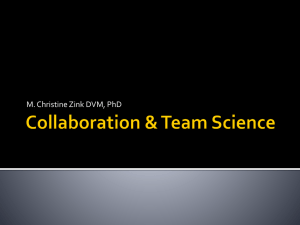
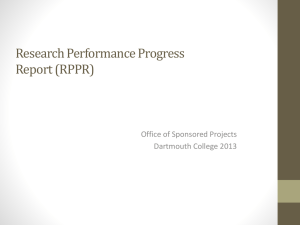
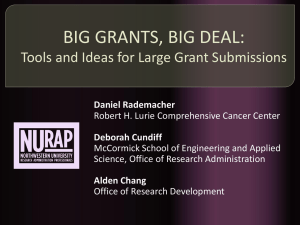
![NIH 101: Part 1 [.ppt]](http://s2.studylib.net/store/data/005398706_1-cbe361c448786ac362a8e75ad39fc05d-300x300.png)
